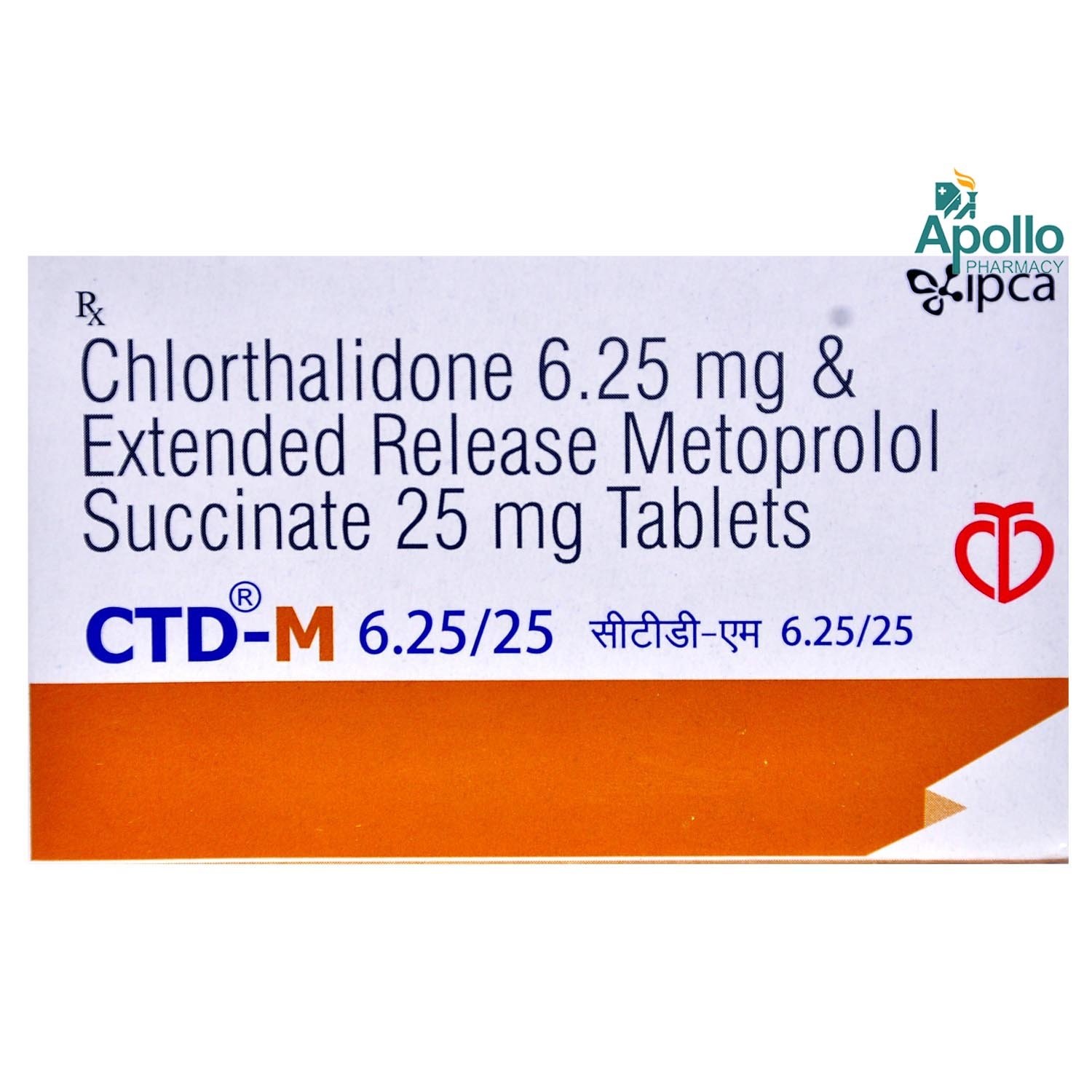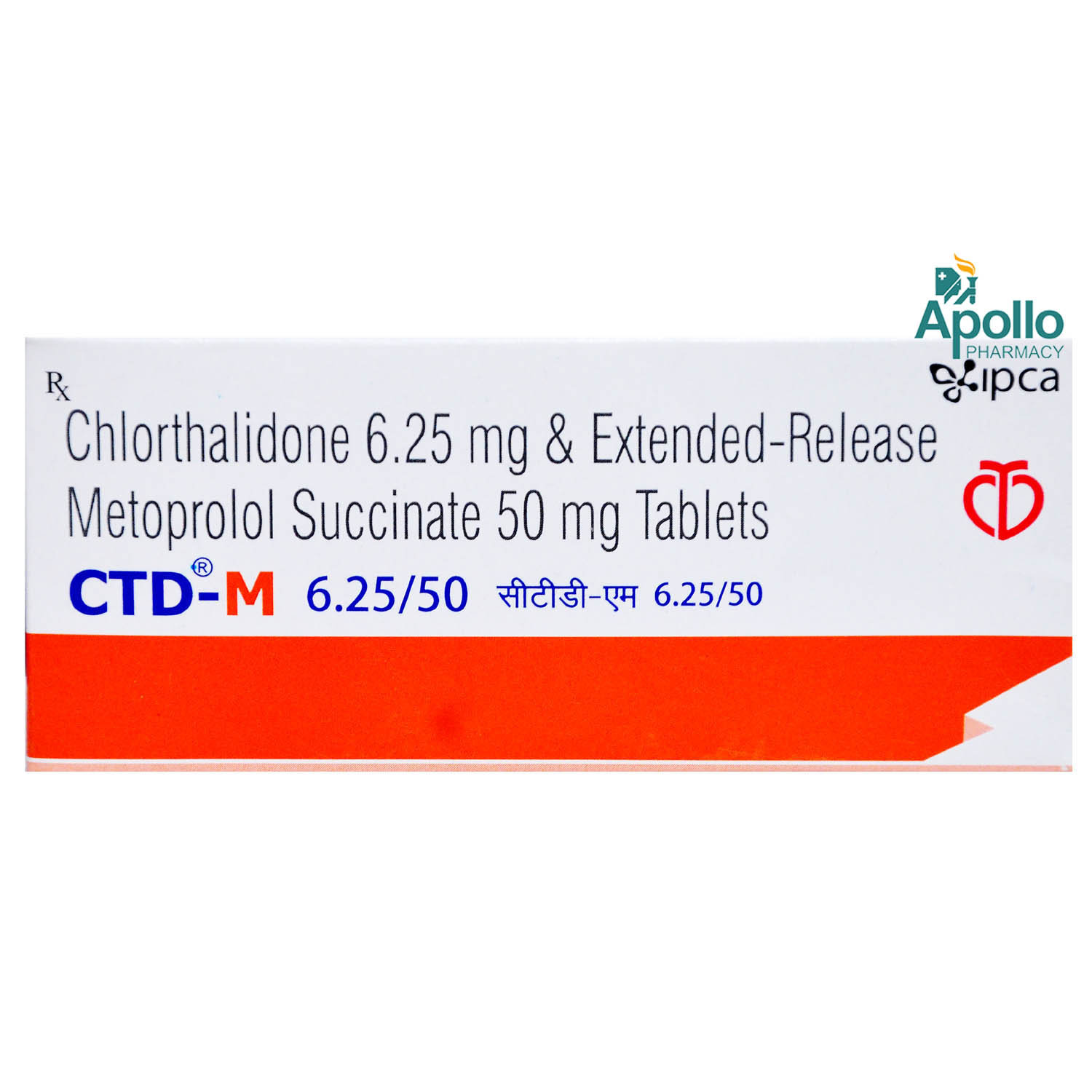Metoprolol+chlorthalidone
About Metoprolol+chlorthalidone
Metoprolol+chlorthalidone belongs to a group of medications called ‘antihypertensives’ used to treat hypertension (high blood pressure). It can also reduce oedema (fluid retention) in hypertensive patients. Hypertension is a condition in which there will be a persistent rise in blood pressure levels. This condition can also cause fluid retention, leading to peripheral oedema (swelling of legs and hands).
Metoprolol+chlorthalidone is a combination of two medicines: Metoprolol and Chlorthalidone. Metoprolol is a beta-blocker and works by blocking epinephrine, resulting in a decrease in heart rate and blood pressure. Chlorthalidone is a diuretic or water pill that acts by expelling excess water and salt from the body. It helps in decreasing fluid accumulation and oedema.
You should take this medicine as prescribed by your doctor. Metoprolol+chlorthalidone may cause some side-effects such as anorexia (loss of appetite), nausea and vomiting, diarrhoea, constipation, jaundice (yellowing of the whites of eyes and skin), dizziness, headache, visual abnormality, photosensitivity (sensitivity to light), orthostatic hypotension (dizziness on standing due to low blood pressure), weakness, restlessness, bradycardia (slow heart rate), and stomach pain. It may also electrolyte levels. If any of these side-effects persist, consult your doctor immediately.
Do not take Metoprolol+chlorthalidone if you are allergic to any contents of it. Do not take Metoprolol+chlorthalidone if you have heart rhythm problems, heart failure, blocked blood vessels, bradycardia (slow heart rate), chest pain, metabolic acidosis (increased acidity in the blood), and hypotension (low blood pressure). Metoprolol+chlorthalidone should be used with caution in patients with kidney or liver diseases, allergy or asthma, and gout (increased uric acid levels in the blood). Also, inform your doctor if you are pregnant and breastfeeding.
Uses of Metoprolol+chlorthalidone
Medicinal Benefits
Metoprolol+chlorthalidone is a combination of two medicines: Metoprolol and Chlorthalidone. Metoprolol is a beta-blocker and works by acting on epinephrine, a hormone that can increase heart rate and blood pressure. So, blocking the action of epinephrine can result in a decrease in heart rate and blood pressure. Chlorthalidone is a diuretic or water pill that acts by expelling excess water and salt from the body. It helps in decreasing fluid accumulation and swelling or edema.
Directions for Use
Storage
Side Effects of Metoprolol+chlorthalidone
- Anorexia (loss of appetite)
- Gastric irritation
- Nausea and vomiting
- Diarrhea
- Constipation
- Jaundice (yellowing of the whites of eyes and skin)
- Dizziness
- Headache
- Visual abnormality
- Photosensitivity (sensitivity to light)
- Orthostatic hypotension (dizziness on standing due to low blood pressure)
- Weakness
- Restlessness
- Bradycardia (slow heart rate)
- Stomach pain
Drug Warnings
Metoprolol+chlorthalidone may cause abnormalities such as electrolyte imbalances such as a decrease in potassium, sodium or chloride levels. So, it is advised to monitor electrolyte levels before initiating this therapy and also should be used with extreme caution in patients with severe liver and kidney disease. Metoprolol+chlorthalidone may cause photosensitivity, so avoid exposure to sunlight for prolonged periods. Metoprolol+chlorthalidone contains lactose, so inform your doctor if you have any intolerance to sugars.
Drug Interactions
Drug-Drug Interaction: Metoprolol+chlorthalidone may interact with antihypertensives (hydralazine), anti-diabetics, stomach ulcer medicines (cimetidine), heart rhythm disorder medicines (amiodarone), antidepressants (lithium), anaesthetics (cyclopropane), erectile dysfunction medicines (alprostadil), anxiolytics (diazepam), non-steroidal anti-inflammatory drugs (indomethacin, celecoxib), antibiotics (rifampicin), antifungals (terbinafine), birth control pills, corticosteroids (hydrocortisone, prednisolone), and hypotension treating drugs (norepinephrine).
Drug-Food Interaction: Alcohol consumption may worsen the side effects; hence please avoid it.
Drug-Disease Interaction: Metoprolol+chlorthalidone should be avoided in conditions such as heart rhythm problems, heart failure, blocked blood vessels, bradycardia (slow heart rate), chest pain, metabolic acidosis (increased acidity in the blood), gout, and systemic lupus erythematosus (a skin condition), myasthenia gravis, psoriasis (an autoimmune skin disease), pheochromocytoma (high blood pressure due to tumor near the kidney), and severe hypotension (low blood pressure).
Drug-Drug Interactions Checker List:
Safety Advice

Alcohol
cautionMetoprolol+chlorthalidone may interact with alcohol and worsen the condition.

Pregnancy
unsafeMetoprolol+chlorthalidone is a category C drug. Metoprolol+chlorthalidone should not be used in pregnant women unless clinically required and when benefits outweigh the risks.

Breast Feeding
cautionMetoprolol+chlorthalidone should be given to breastfeeding mothers only if clinically needed.

Driving
cautionMetoprolol+chlorthalidone may cause dizziness. So, refrain from activities that require you to stay alert such as driving and operating heavy machinery.

Liver
cautionMetoprolol+chlorthalidone should be used with caution in patients with severe liver diseases. Dose adjustments may be necessary.

Kidney
cautionMetoprolol+chlorthalidone should be used with caution in patients with severe kidney diseases. Regular monitoring of serum electrolyte levels and dose adjustments are necessary.

Children
unsafeMetoprolol+chlorthalidone is not recommended for use in children.
Habit Forming
Diet & Lifestyle Advise
- Keep your weight under control with BMI (Body Mass Index) 19.5-24.9.
- Do regular physical activity or exercise for at least 150 minutes per week, or about 30 minutes most days of the week. Doing this can help you to lower your raised blood pressure by about 5 mm of Hg.
- Opt for a diet rich in whole grains, fruits, veggies, and low-fat dairy products.
- If you are taking alcohol then only one serving for women and two servings for men is advisable.
- Quitting smoking is the best strategy to lower the risk of heart disease.
- Avoid chronic stress as it can raise your blood pressure. Try to enjoy and spent time with your loved ones to cope with stress and practice mindfulness techniques.
- Monitor your blood pressure daily and if there is too much fluctuation then immediately contact your doctor.
- Try to include heart-healthy omega 3 fatty acids containing food drinks in your daily diet. You can also use low-fat cooking oil like olive oil, soybean oil, canola oil, and coconut oil can help in lowering your elevated blood pressure.
Special Advise
- Limit intake of sodium chloride (table salt) in your daily diet to 2300 mg per day or less than 1500 mg is ideal for most adults.
- Check your blood pressure regularly and make sure your blood pressure does go below than normal, consult your doctor when needed.
Patients Concern
Disease/Condition Glossary
Hypertension: It is a chronic (long-term) condition in which blood pressure is elevated persistently at higher than normal levels. It occurs when the blood’s force against the wall of blood vessels is too high. This condition can cause chest pain (angina) and heart attack (when blood supply to the heart is blocked). Additionally, high blood pressure also causes damage to the brain, kidneys, and eyes. The risk of high blood pressure complications increases with the following: obesity, smoking, diabetes, alcohol intake, lack of physical inactivity, stress, and kidney diseases.
FAQs
Metoprolol+chlorthalidone is a combination of two medicines: Metoprolol and Chlorthalidone. It acts by blocking the action of epinephrine hormone that can increase heart rate and blood pressure and also helps to expel excess fluid out of the body reducing edema or swelling.
Metoprolol+chlorthalidone may cause orthostatic hypotension. So, stand up slowly while rising from a lying or sitting position. Also, it causes photosensitivity, so avoid prolonged exposure to sunlight and use a sunscreen of high SPF while going outdoors.
It is advised to limit intake of bananas and other foods rich in potassium such as tomato, avocado, and papaya to avoid the risk of side-effects.
Hypertension is a chronic condition, so Metoprolol+chlorthalidone is prescribed for several weeks to months to control the blood pressure and also to reduce complications associated with it.
Metoprolol+chlorthalidone may cause side-effects such as anorexia (loss of appetite), nausea and vomiting, diarrhea, constipation, jaundice (yellowing of the whites of eyes and skin), dizziness, headache, visual abnormality, photosensitivity (sensitivity to light), orthostatic hypotension (dizziness on standing due to low blood pressure), weakness, restlessness, bradycardia (slow heart rate), and stomach pain. It may also alter electrolyte levels. If any of these side-effects persist, consult your doctor immediately.








